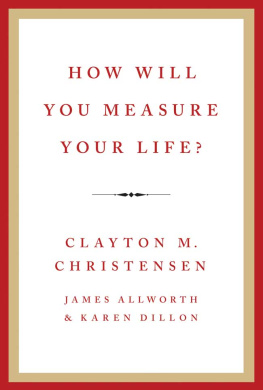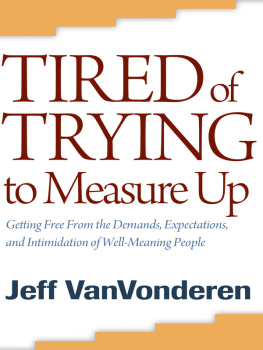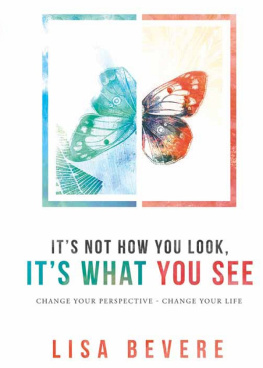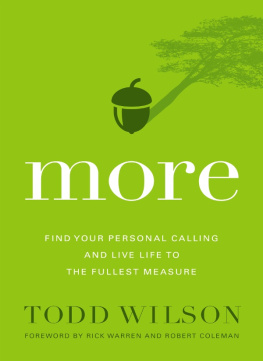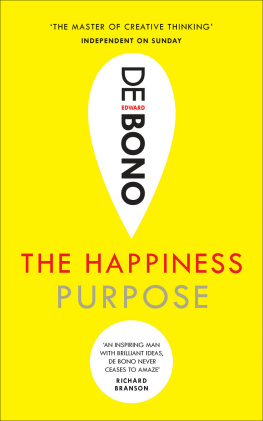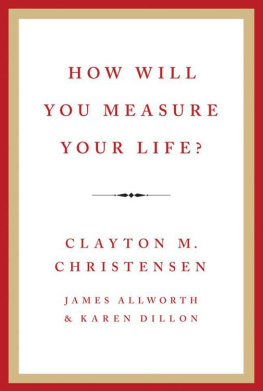Woodman Jeff - How Will You Measure Your Life?
Here you can read online Woodman Jeff - How Will You Measure Your Life? full text of the book (entire story) in english for free. Download pdf and epub, get meaning, cover and reviews about this ebook. City: New York, year: 2012, publisher: HarperCollins US;Harper Audio, genre: Business. Description of the work, (preface) as well as reviews are available. Best literature library LitArk.com created for fans of good reading and offers a wide selection of genres:
Romance novel
Science fiction
Adventure
Detective
Science
History
Home and family
Prose
Art
Politics
Computer
Non-fiction
Religion
Business
Children
Humor
Choose a favorite category and find really read worthwhile books. Enjoy immersion in the world of imagination, feel the emotions of the characters or learn something new for yourself, make an fascinating discovery.
- Book:How Will You Measure Your Life?
- Author:
- Publisher:HarperCollins US;Harper Audio
- Genre:
- Year:2012
- City:New York
- Rating:5 / 5
- Favourites:Add to favourites
- Your mark:
- 100
- 1
- 2
- 3
- 4
- 5
How Will You Measure Your Life?: summary, description and annotation
We offer to read an annotation, description, summary or preface (depends on what the author of the book "How Will You Measure Your Life?" wrote himself). If you haven't found the necessary information about the book — write in the comments, we will try to find it.
How Will You Measure Your Life? — read online for free the complete book (whole text) full work
Below is the text of the book, divided by pages. System saving the place of the last page read, allows you to conveniently read the book "How Will You Measure Your Life?" online for free, without having to search again every time where you left off. Put a bookmark, and you can go to the page where you finished reading at any time.
Font size:
Interval:
Bookmark:

To our families


O N THE LAST day of the course that I teach at Harvard Business School, I typically start by telling my students what I observed among my own business school classmates after we graduated. Just like every other school, our reunions every five years provided a series of fascinating snapshots. The school is superb at luring back its alumni for these events, which are key fund-raisers; the red carpet gets rolled out with an array of high-profile speakers and events. My own fifth-year reunion was no exception and we had a big turnout. Looking around, everyone seemed so polished and prosperouswe couldnt help but feel that we really were part of something special.
We clearly had much to celebrate. My classmates seemed to be doing extremely well; they had great jobs, some were working in exotic locations, and most had managed to marry spouses much better-looking than they were. Their lives seemed destined to be fantastic on every level.
But by our tenth reunion, things that we had never expected became increasingly common. A number of my classmates whom I had been looking forward to seeing didnt come back, and I had no idea why. Gradually, by calling them or asking other friends, I put the pieces together. Among my classmates were executives at renowned consulting and finance firms like McKinsey & Co. and Goldman Sachs; others were on their way to top spots in Fortune 500 companies; some were already successful entrepreneurs, and a few were earning enormous, life-changing amounts of money.
Despite such professional accomplishments, however, many of them were clearly unhappy.
Behind the facade of professional success, there were many who did not enjoy what they were doing for a living. There were, also, numerous stories of divorces or unhappy marriages. I remember one classmate who hadnt talked to his children in years, who was now living on the opposite coast from them. Another was on her third marriage since wed graduated.
My classmates were not only some of the brightest people Ive known, but some of the most decent people, too. At graduation they had plans and visions for what they would accomplish, not just in their careers, but in their personal lives as well. Yet something had gone wrong for some of them along the way: their personal relationships had begun to deteriorate, even as their professional prospects blossomed. I sensed that they felt embarrassed to explain to their friends the contrast in the trajectories of their personal and professional lives.
At the time, I assumed it was a blip; a kind of midlife crisis. But at our twenty-five- and thirty-year reunions, the problems were worse. One of our classmatesJeffrey Skillinghad landed in jail for his role in the Enron scandal.
The Jeffrey Skilling I knew of from our years at HBS was a good man. He was smart, he worked hard, he loved his family. He had been one of the youngest partners in McKinsey & Co.s history and later went on to earn more than $100 million in a single year as Enrons CEO. But simultaneously, his private life was not as successful: his first marriage ended in divorce. I certainly didnt recognize the finance shark depicted in the media as he became increasingly prominent. And yet when his entire career unraveled with his conviction on multiple federal felony charges relating to Enrons financial collapse, it not only shocked me that he had gone wrong, but how spectacularly he had done so. Something had clearly sent him off in the wrong direction.
Personal dissatisfaction, family failures, professional struggles, even criminal behaviorthese problems werent limited to my classmates at HBS. I saw the same thing happen to my classmates in the years after we completed our studies as Rhodes Scholars at Oxford University. To be given that opportunity, my classmates had to have demonstrated extraordinary academic excellence; superior performance in extracurricular activities such as sports, politics, or writing; and significant contributions to their communities. These were well-rounded, accomplished people who clearly had much to offer the world.
But as the years went by, some of my thirty-two Rhodes classmates also experienced similar disappointments. One played a prominent role in a major insider trading scandal, as recounted in the book Den of Thieves . Another ended up in jail because of a sexual relationship with a teenager who had worked on his political campaign. He was married with three children at the time. One who I thought was destined for greatness in his professional and family spheres has struggled in bothincluding more than one divorce.
I know for sure that none of these people graduated with a deliberate strategy to get divorced or lose touch with their childrenmuch less to end up in jail. Yet this is the exact strategy that too many ended up implementing.
I dont want to mislead you. Alongside these disappointments, there are many of my classmates who have led exemplary personal lives; they have truly been an inspiration to me. But our lives are not over, and the lives of our children are just now unfolding. Understanding what causes the problems that trapped some of my classmates is important not just for those who have come off the path that they had planned to follow but for those whose lives are still on the right pathas well as those whose journeys are just beginning. We all are vulnerable to the forces and decisions that have derailed too many.
I am among those who have been fortunate so farin many ways due to my wonderful wife, Christine, who has helped us see into the future with remarkable prescience. It would be folly for me to write this book, however, to proclaim that everyone who replicates the decisions we have made will be happy and successful, too. Instead, in writing this book, I have followed the approach that has characterized my management research.
I have engaged my students in the quest as well. In my MBA course, Building and Sustaining a Successful Enterprise, we study theories regarding the various dimensions of the job of general managers. These theories are statements of what causes things to happenand why. When the students understand these theories, we put them onlike a set of lensesto examine a case about a company. We discuss what each of the theories can tell us about why and how the problems and opportunities emerged in the company. We then use the theories to predict what problems and opportunities are likely to occur in the future for that company, and we use the theories to predict what actions the managers will need to take to address them.
By doing this, the students learn that a robust theory is able to explain what has and what will occur across the hierarchy of business: in industries; in the corporations within those industries; in the business units within those corporations; and in the teams that are within the business units.
In the past several years, on the last day of my class after Ive summarized what so frequently happens in the lives of our graduates, we have taken the discussion a step further, plumbing to the most fundamental element of organizations: individuals. For this discussion, rather than use businesses as the case studies, we use ourselves.
I participate in these discussions with more history than my students do, but I follow the same rules. We are there to explore not what we hope will happen to us but rather what the theories predict will happen to us, as a result of different decisions and actions. Because Ive been present in these discussions over many years, Ive learned more about these issues than any one group of my students ever has. To even the score with them, however, I have shared stories about how these theories have played out in my life.
Font size:
Interval:
Bookmark:
Similar books «How Will You Measure Your Life?»
Look at similar books to How Will You Measure Your Life?. We have selected literature similar in name and meaning in the hope of providing readers with more options to find new, interesting, not yet read works.
Discussion, reviews of the book How Will You Measure Your Life? and just readers' own opinions. Leave your comments, write what you think about the work, its meaning or the main characters. Specify what exactly you liked and what you didn't like, and why you think so.

